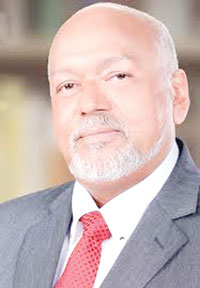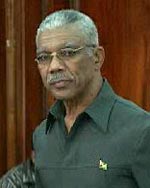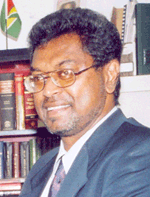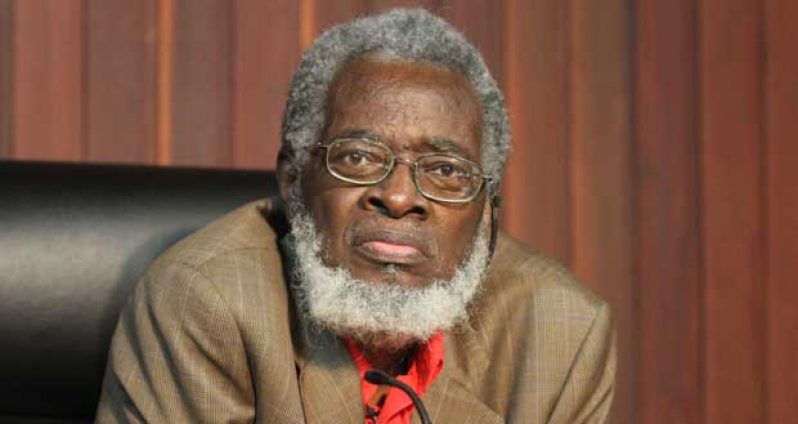PRESIDENT Donald Ramotar has no intention to prorogue Parliament a second time, after having done so on Monday, but will move straight into “snap” elections if another genuine attempt by his Administration at dialogue with A Partnership for National Unity (APNU) and the Alliance For Change (AFC) fails.This was according to Head of the Presidential Secretariat (HPS), Dr. Roger Luncheon, who made it clear that the reason for the prorogation was to attempt dialogue in the interest of the Guyanese people.

“Elections, the President is absolutely categorical. He has absolutely no intention of proroguing and re-re-proroguing. He has said that on umpteen occasions and he has said this to the Opposition,” the HPS said, at his weekly press conference, yesterday, held at the Office of the President.
As a result of prorogation, the first session of the 10th Parliament, is suspended up to a maximum of six months – a move that is provided for in Section 70 (1) of Guyana’s Constitution.
FEELING THWARTED
Dr. Luncheon acknowledged that the leaders of APNU and AFC have made clear that there will be no dialogue without the reconvening of Parliament.
However, he contends the combined Opposition clearly feels “thwarted” in moving to the dissolution of Parliament, via the passage of the AFC- sponsored no-confidence motion against the Government.
He said, “I think the Opposition feels thwarted in that their option, the one to which their language and their public exhortations suggested that they would have engaged, this is the involuntary dissolution of the 10th Parliament after the passage of the no-confidence motion, was thwarted by the President’s constitutional intervention.”
The effect of ending a session by prorogation is to terminate business. Members are released from their parliamentary duties until Parliament is next summoned. All unfinished business is dropped from or “dies” on the Order Paper, the National Assembly’s agenda, and all committees lose their power to transact business, providing a fresh start for the next session. No committee can sit during a prorogation. Bills which have not received Royal Assent before prorogation are “entirely terminated” and, in order to be proceeded with in the new session, must be re-introduced as if they had never existed.
As a result, the AFC’s no-confidence motion was not considered. The main Opposition, APNU had, prior to Monday, signalled its intent to support the motion.
Had it not been for the proclamation to prorogue Parliament, and had the no-confidence motion been passed, Guyana would have been headed to early general elections within three months.
According to President Ramotar, the move to prorogation was intended to pave the way for greater dialogue among political parties, while keeping the 10th Parliament alive.
OPTIMISTIC OF CHANGE OF HEARTS
The HPS, regardless, expressed optimism that there could be a change of heart in the Opposition camps.

He added that the initial, negative reactions were expected, but urged that they “should not be taken to the bank.”
“I don’t believe (however) that the initial and immediate reactions should be assumed to constitute the more permanent and more mature positions….unless time proved otherwise, I do not believe that these initial reactions should be taken to the bank. I would hesitate,” Dr. Luncheon said.
The HPS stressed that the “big picture” is the fact that the President has made another genuine attempt at dialogue with A Partnership for National Unity (APNU) and the Alliance For Change (AFC) in the interest of the Guyanese people.
“Voluntary and involuntary dissolution of the Parliament are both constitutional provisions…similar circumstances over time have not prevented a reasonable outcome…I think this is what the six months is what was included by the drafters of the constitution,” he said.
Dr. Luncheon reiterated that the exercise of President Ramotar’s constitutional right was in the interest of preserving the life of the 10th Parliament to address the many outstanding issues of national importance, including several important Bills and consideration of matters current in parliamentary committees.

“There are a whole host of unfinished business that this 10th Parliament has progressed from its initial sitting in 2012 and to irrevocably and irreversibly rub that out was something none of us in the Administration could have stomached, not without a fight, not without another effort…the records will show that the PPP/C Administration did all that was constitutionally possible and all that reasonably could have [been] done, we went the extra effort, to avoid such a situation,” he said.
The prevailing situation is not “world war three” as is portrayed, the HPS contends; however, he conceded that it could be termed a “min-crisis” of sorts.
“Time will tell…I will concede that the hype, the language, will have us think we are on the verge of world war three, but I am willing to recognise that similar circumstances over time have not prevented a reasonable outcome, eventually,” he said.
The developments in the success of dialogue, Dr. Luncheon concluded, will have to be monitored over time.





.jpg)








